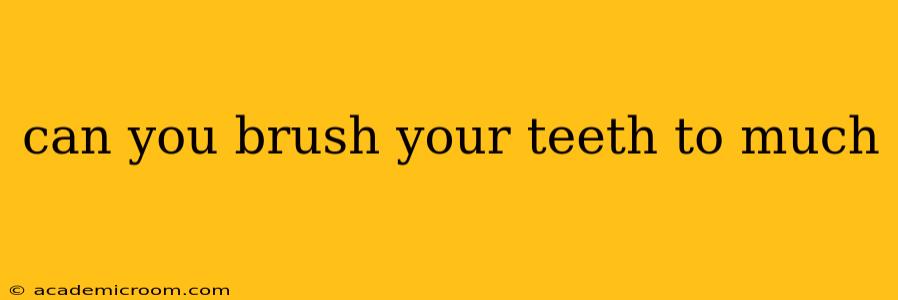Can You Brush Your Teeth Too Much? The Fine Line Between Clean and Damaged
Brushing your teeth is crucial for maintaining good oral hygiene, but is it possible to overdo it? The short answer is yes. While regular brushing is essential, excessive brushing can actually damage your teeth and gums. This article explores the potential consequences of overzealous brushing and provides guidance on achieving optimal oral health.
How Often Should You Brush Your Teeth?
The American Dental Association (ADA) recommends brushing your teeth twice a day for at least two minutes each time, using fluoride toothpaste. This guideline is a solid starting point for most adults and children. However, individual needs may vary based on factors like diet, dental history, and susceptibility to cavities.
What Happens If You Brush Too Much?
Over-brushing can lead to several detrimental effects:
-
Gum Recession: Aggressive brushing, especially with a hard-bristled toothbrush, can wear away the gums, exposing the tooth roots. This makes your teeth more sensitive and vulnerable to decay.
-
Tooth Enamel Erosion: Enamel is the protective outer layer of your teeth. Excessive brushing can gradually erode this enamel, leading to increased sensitivity and a higher risk of cavities. This is particularly true if you use a harsh toothpaste with high abrasiveness.
-
Abrasion: The abrasive action of brushing, even with a soft-bristled brush, can wear down the tooth surface over time if done excessively. This leads to visible wear and tear.
-
Gum Injury: Vigorous brushing can injure your gums, causing inflammation, bleeding, and potentially leading to gum disease (gingivitis or periodontitis).
What are the signs of brushing too hard?
Recognizing the signs of excessive brushing is key to preventing damage. Look out for:
- Bleeding gums: While occasional bleeding might be normal, consistent bleeding during or after brushing is a warning sign.
- Receding gums: Noticeable gum line changes, with more of the tooth root showing, indicate potential over-brushing.
- Sensitive teeth: Increased sensitivity to hot, cold, or sweet foods and drinks could be a sign of enamel erosion.
- Wear and tear on teeth: Visible grooves or flat spots on the teeth can point towards abrasive brushing.
What kind of toothbrush should I use?
Choosing the right toothbrush is crucial. Opt for a soft-bristled brush and replace it every three to four months, or sooner if the bristles are frayed. A worn-out brush is less effective and more likely to cause damage.
What if I'm worried about plaque buildup?
If you're concerned about plaque buildup despite brushing twice a day, consider incorporating other oral hygiene practices like flossing daily and using an antimicrobial mouthwash. Regular dental checkups and professional cleanings are also essential. Your dentist can offer personalized advice based on your specific needs.
How can I brush my teeth properly without overdoing it?
Focus on gentle, circular motions, ensuring you cover all surfaces of each tooth. Avoid scrubbing back and forth aggressively. Remember, effective brushing doesn't require excessive force. A light touch is often more effective and prevents damage.
Is it better to brush once a day or three times a day?
Brushing twice a day is generally recommended. While brushing more frequently might seem beneficial, it increases the risk of damaging your teeth and gums. The focus should be on proper technique and consistency rather than frequency.
In conclusion, maintaining excellent oral hygiene is vital, but it's equally important to practice moderation. Brushing too much can be just as detrimental as brushing too little. By adopting a gentle brushing technique, using a soft-bristled brush, and scheduling regular dental checkups, you can ensure your teeth and gums stay healthy and strong for years to come.
